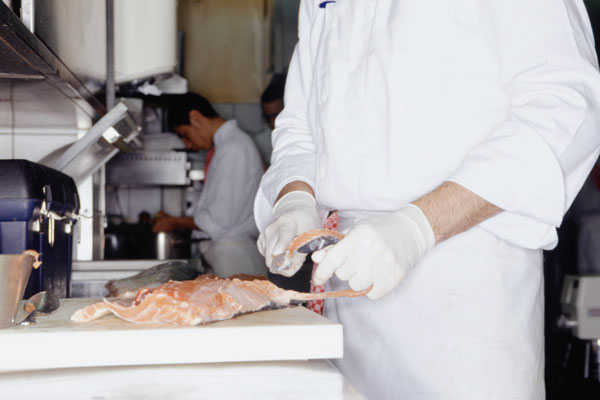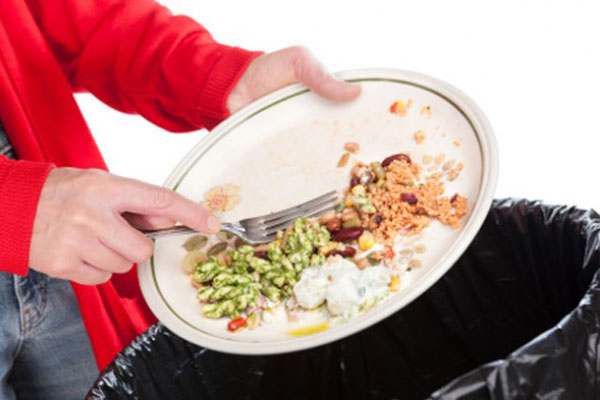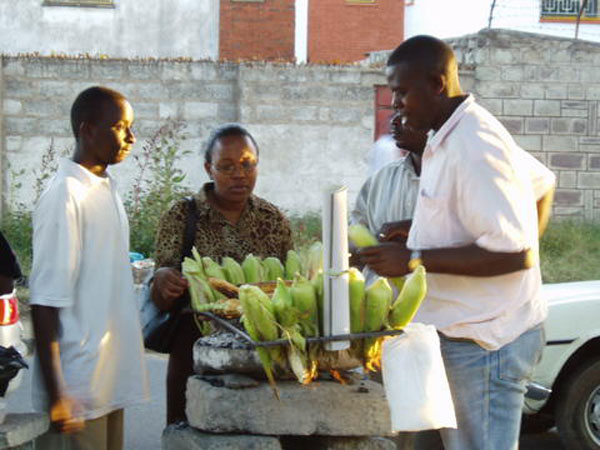- Food poisoning is an illness caused by eating contaminated food.
- The signs and symptoms of food poisoning include:
- When you observe these signs and symptoms after taking food or drink, consult a doctor immediately.
1. Eating foods contaminated with toxic chemicals.
The body reacts to chemicals through vomiting, stomach-ache or diarrhoea.
Such chemicals include:
2. Eating foods that are naturally poisonous, such as some types of mushrooms and some cassava.
3. Eating food that is contaminated with disease-causing micro-organisms.
Micro-organisms cause stored or leftover food to go bad when they grow on it.
They include viruses, fungi, and bacteria.
4. Eating raw or undercooked meat,
for example, pork may lead to food poisoning because the pork maybe containing tapeworms that get into the body of a healthy person.

Foods can become contaminated through various ways.
Some of them are listed below.
1. Insects like flies and cockroaches may excrete on the stored or leftover food and in the process also deposit micro-organisms whose growth on food leads to food poisoning.
2. Bird’s excreta on sun-dried food such as grains may have micro-organisms that cause food poisoning.
3. Poor storage of food, for example, storing maize in damp places leads to the growth of fungi that produce aflatoxin in the maize.
This makes it poisonous.
4. Bacteria grow and produce chemicals that cause spoilage and food poisoning.
5. Food can become contaminated by chemicals such as fertilizers, pesticides and insecticides that come into contact with the food during spraying.
6. Poor personal hygiene can also cause food poisoning.
For instance, when people handle raw meat, they fail to wash their hands with warm water and soap, and then eat something with their unwashed hands causes food poisoning.
7. Spraying vegetables with pesticides or insecticides then harvesting them before the active period of the chemicals as indicated by the manufacturers on the chemical’s container has expired.
Such vegetables may have absorbed the toxic chemicals found in the pesticides which may cause ill health.
The following are some of the ways of preventing food poisoning:
1. Proper storage of food, whether raw, cooked or leftover.
Food should be kept in a cool, dry place.
Fungi that cause food poisoning to grow under warm and moist conditions.
2. The storage place should not be infested by flies, cockroaches or any other pests that carry micro-organisms that cause food poisoning.
3. Carefully, study the labels of packaged food, whether canned or bottled, to know the expiry dates of the food.
Food that has expired is not fit for human consumption and should never be eaten.
4. Sprayed fruit and vegetables should only be harvested and used after the end of the active time or period recommended for the pesticide by the manufacturers.
5. We should emphasize on proper and hygienic handling of food during preparation. Hands should be washed thoroughly and properly with warm running water and soap before cooking and handling food.
6. Food handlers should also be regularly examined by doctors to ensure that they are medically fit to handle food.

7. Raw meat should be kept away from other food.
Food should always be properly cooked.
8. Knives and other equipment used to handle food should be washed thoroughly after using them.
9. We should avoid eating leftover foods.

10. Avoid eating foods that are prepared and sold by the roadside, for example, roasted maize.
